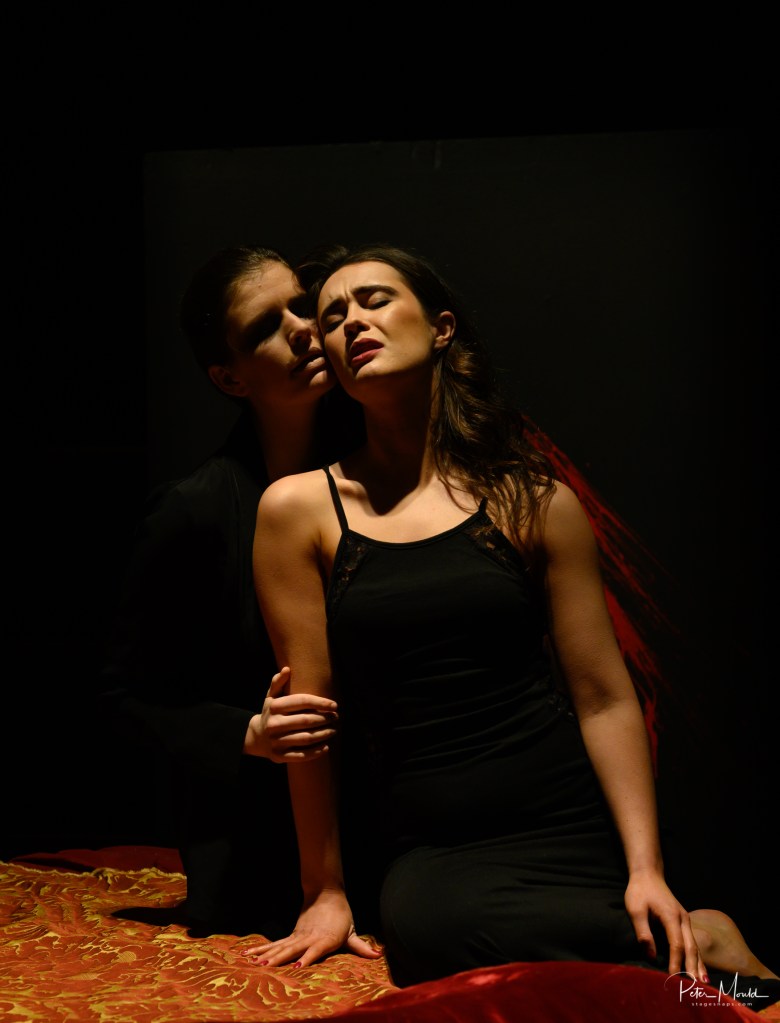L’Incoronazione Di Poppea
Uneasy Rests the Head
L’Incoronazione Di Poppea
by Claudio Monteverdi, libretto by Giovanni Francesco Busenello
Ensemble OrQuesta at Arcola Theatre, Dalston until 30th July
Review by Patrick Shorrock
The wonderful Grimeborn Opera Festival celebrates its fifteenth season at the Arcola Theatre, Dalston, with a musically fine performance of Monteverdi’s most ambivalent opera, The Coronation of Poppea in Italian with surtitles. By throwing off the constraints of big opera house performance, Grimeborn has been able to develop an innovative approach that not only covers the standard repertoire but puts on neglected pieces that nobody else would dare risk. It seems to be acquiring an increasing musical confidence in doing this.

Poppea – not quite standard repertoire – is a strange piece in many ways, not least by having the emperor Nero as its (anti)hero. There is an awful lot of recitative, but also possibly the most ravishing closing duet in all baroque opera (maybe not even by Monteverdi, just to add to the ambivalence). Nero and Poppea rejoice together at her being crowned as his new empress, and time seems to stand still at their mutual musical rapture. And yet they have had to dispose of a number of people opposing this marriage (including his tutor Seneca, and current wife Ottavia) which we have seen them do with no hint of conscience or regret. Helen May – sweetly voiced but neurotically anxious as Poppea – and Julia Portela Piňőn’s dark toned Nero blended beautifully, although Piňőn was not remotely convincing as a psychopathic tyrant. I’m really not sure what the point of giving the role to a mezzo is when there are so many good countertenors around.
The opera can be read as a celebration of primitive instincts overcoming moral constraints. This is very much the point made in the allegorical prologue, where Virtue and Fortune (what today we might call conscience and luck or privilege) acknowledge the superior power of Love (what today we might call sex). The ‘virtuous’ characters Seneca (Gheorghe Palcu with some stunningly deep, secure and unwobbly low notes) and Ottavia (a wonderfully vehement Hazel Neighbour) certainly display a degree of pomposity and petulance respectively. However, they get some wonderful vocal opportunities, which Palcu and Neighbour make the most of.

Once you know that Nero subsequently killed Poppea by giving her a kick when pregnant, this celebration of instinct feels rather more ambivalent. The production shows an awareness of the grim outcome of their marriage, but there seems something a bit half-hearted and tentative about its ‘shock’ ending. And its grasp of history is less than secure, as Ottone (Poppea’s ex), thinly sung by counter tenor Eric Schlossberg, is executed rather than pardoned. This is dramatically neater, but history rather untidily requires him to survive, as he subsequently became emperor after Nero (but only briefly).
Music director Marco da Silva displays an impressive ability to multitask, as he is also responsible for staging the piece, in addition to playing recorders and a small role, and designing the lighting. But this means he is spread rather thin. There is a lack of urgency and momentum in putting the music across. With languor as the default setting, all those post-coital raptures and protracted farewells feel rather drawn out. Or maybe he simply lets his singers set the pace and they tend to dawdle.
The intimate space of the Arcola – where even an arch lute can be easily heard – enables the singers to make a direct impact through what they sing. His modern dress production never gets in the way, but isn’t particularly illuminating. Poppea tends to lie on a bed in the middle of the stage whether actually present or not. Every time Nero orders an execution, the victim daubs a red stripe of paint on the boards on either side of the stage. It doesn’t really add much.
The instrumentalists and singers are pretty impressive. Kieran White has an excellent fluent tenor and strong dramatic presence that brings the music to life. His portrayal of the nurse Arnalta – a comic travesty role but with an achingly beautiful lullaby – was brilliantly done. You would barely realise that it was the same performer when he sings Nero’s macho drinking buddy Lucano. Other members of the cast also take more than one role, with Anna-Luise Wagner outstanding as Love and Damilgella. I wish she had had more to do.
Patrick Shorrock, July 2022
Photography by Peter Mould Stage Snaps



Trackbacks & Pingbacks